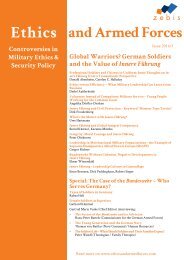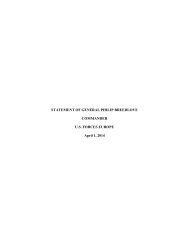FULLTEXT01
FULLTEXT01
FULLTEXT01
Create successful ePaper yourself
Turn your PDF publications into a flip-book with our unique Google optimized e-Paper software.
TACTICAL THOUGHT<br />
2014 September 29 th<br />
Moreover, discussing combined operations with ranger units and mechanized units has<br />
not yet become a natural tactical, or operational art discussion. The Regular Warfare<br />
tradition lingers on; partly questioned in Irregular Warfare contexts, particularly due to<br />
international military thought developments since around 2008. We can let Antony<br />
King´s argument of trans-nationalization of military thought support this view.<br />
What does that mean in that case, for a supposed “field of Swedish military thought”<br />
Does it exist any longer at all or has it evaporated into a “western field of military<br />
thought” Has the revival of Irregular Warfare meant a diffusion of an earlier national<br />
field of military thought or do we stand on the brink of quite a new content and value<br />
distribution in an old field The field theory informs us that three dimensions or aspects<br />
are said to affect a field's presence, its structure, agents' choices and the existing<br />
opportunities. Bourdieu’s view of the future of a field is; “a field's future is at every<br />
moment inscribed in its structure, agent’s ability to realize the objective potentials as<br />
determined by the relationship between agents' abilities and the opportunities that are<br />
objectively inscribed in the field.” 207 The question of what abilities the agents have<br />
based on and what opportunities they are able to recognise, involves intellectual and<br />
practical thinking, understandings and actions. If thought on tactics in Irregular Warfare<br />
partly corresponds and contradicts the Regular Warfare perception, a struggle is<br />
probably going to take place.<br />
Will the classic principles of Small Wars be involved and recognized as a developed<br />
understanding of warfare (as in the 16 th and 17 th centuries) or will it once again be<br />
forgotten The answer goes beyond the area of Swedish military thought, but is still a<br />
part of the same. In all, we can see signs of a questioned doxa of warfare and, which is<br />
also a question of military sociology; if knowledge is sought regarding the character of<br />
thought driving structures. The agents' positions in this study and relationships to “the<br />
field of military thought”, could thus be seen as belonging to a possible subset in the<br />
total area of preferences that incorporate aspects of both Regular, Irregular, and Hybrid<br />
Warfare, or in short; Warfare. Such a possible field of military thought is likely to be<br />
found at a higher level, consisting of both strategy and tactics.<br />
The indications of a social space regarding tactics in Irregular Warfare, with a diverse<br />
preference structure, feed the question of character and structural pattern in this larger<br />
field. Diverse tactical thinking in a nowadays recognized context of conflicts, questions<br />
the strategic thinking distribution in a larger field of military thought. What social,<br />
cultural, and obviously economic and symbolic capital distributions are possible to<br />
unveil beneath articulated standpoints of military thought of strategy and tactics in<br />
general These are the kinds of larger questions that this Bourdieu inspired approach to<br />
the concepts of field theory and capital concept will inevitably lead to.<br />
207 Bourdieu, Praktiskt förnuft, bidrag till en handlingsteori, (2004), p. 13.<br />
121





